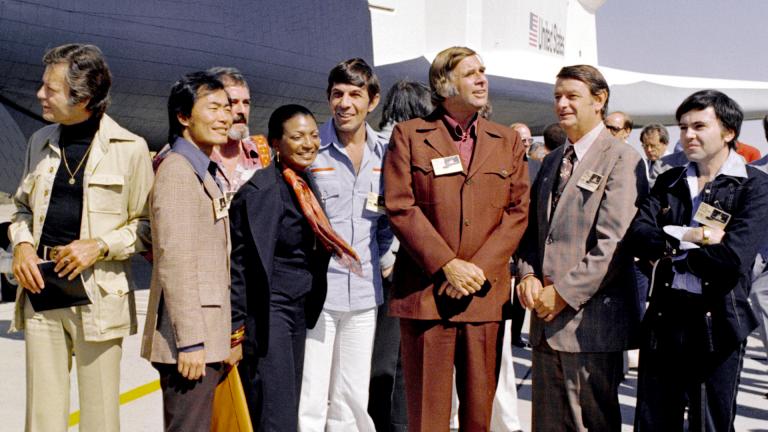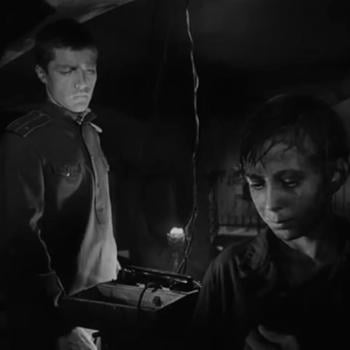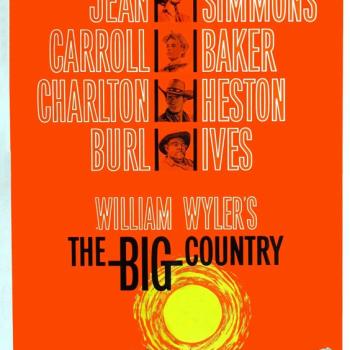Ever since I read in her Ethics Daily profile that our co-blogger Beth is a fellow Trekkie, I’ve been toying with doing a Star Trek post. Then came this embarrassing result of some office cleaning…
https://twitter.com/cgehrz/status/1124331579168448513
Why fight it? Today I thought I’d do a change of pace and revisit something I had mentioned on my own blog a couple years back: the religious (and irreligious) history of my favorite science fiction universe. As before, I’ll lean on Bernd Schneider’s article on religion at his Star Trek site, Ex Astris Scientia.
(By the way, if you know that that Latin slogan — “from the stars, knowledge” — is the motto of Star Fleet Academy, then this post is right up your alley. If not… maybe go ahead and spend the time digging through my archives.)
My own Trek story begins in the mid-1980s with Star Trek: The Next Generation (TNG). Producer Brannon Braga insisted that “there was no consideration in giving humans, talking about God, or talking about those types of things. We wanted to avoid it to be quite frank.” But Braga, who went on to produce the lesser Voyager and Enterprise spinoffs, also was interested in exploring religion through other species, like the hive-mind Borg. Most religious of all were the Bajora, a post-colonial people who were introduced on TNG and then played a central role on the spinoff Deep Space Nine (DS9), in which Schneider thinks “the reputation of religion in Trek has improved… even if it is only an exception made for recurring characters.”
(Writing for the sci-fi blog io9 in 2008, Charlie Jane Anders went even further: “Deep Space Nine has religion built into its DNA at so many levels, it’s practically a religious allegory with space-opera trappings.” And while she was ultimately dissatisfied with that show’s treatment of faith, she argued that DS9 writer-producer Ron Moore learned lessons from that experience when he went on to produce a show whose religious themes were at least as prominent, but rendered with greater nuance and insight: Battlestar Galactica.)
But my favorite of the Treks is still the original series (TOS), on which Schneider detects the influence of creator Gene Roddenberry’s hostility to organized religion and theistic faith:
Religion seems to be largely absent from the futuristic and secular world of the Federation and in particular from human society. Star Trek’s takes on religious topics are often critical, and they almost routinely close with a victory of science over faith.
Now, Schneider acknowledges that “explicit anti-religious statements are comparably rare in Star Trek, even during most of the time when Roddenberry was still alive.” A 1968 episode set on a parallel Earth even gave a positive portrayal of anti-Roman rebels who worshipped “the Son of God” (so said Uhura, correcting Spock for once). The two weakest of the movies made with the original cast (Star Trek: The Motion Picture and the William Shatner-directed The Final Frontier) were rather overtly spiritual, concerned with themes of creation and transcendence.
But several episodes of TOS explore the dangerous power of religious belief, with Kirk and crew having to fight against god-like figures. And in a 1991 interview with The Humanist, Roddenberry claimed that he flatly refused to add a chaplain to the Enterprise crew.
So why was Roddenberry so hostile to religion? In his Humanist interview, he described his atheism as a backlash against the Baptist faith of his mother:
I guess I was around fourteen and emerging as a personality… I listened to the sermon, and I remember complete astonishment because what they were talking about were things that were just crazy. It was communion time, where you eat this wafer and are supposed to be eating the body of Christ and drinking his blood. My first impression was, “This is a bunch of cannibals…”
I’m not sure what kind of Baptist church taught young Roddenberry transubstantiation, but his experience convinced him “that religion was largely nonsense—largely magical, superstitious things… so full of inconsistencies that I could see no point in arguing each inconsistency out. It was background noise that you ignore.”
I wonder now if there’s not a bit more to the story… I initially wrote about Schneider’s article on religion in Star Trek during my 2016 sabbatical, when I was only starting to think through my next project. Now that I’m well into my “spiritual, but not religious” biography of Charles Lindbergh, I’ve got another theory: Star Trek represents a Space Age articulation of the “techno-religion” that historian Joseph Corn called the “winged gospel.” (I blogged about this last March.) “Like the Christian gospels,” Corn wrote, “the gospel of aviation held out a glorious promise, that of a great new day in human affairs once airplanes brought a true air age.”
I don’t recall Corn making the connection from the “airmindedness” of the 1920s to the science fiction of the 1950s and 1960s. But it’s worth noting that before he became a TV writer, Gene Roddenberry flew airplanes. He received his pilot’s license just before World War II, flew almost ninety bombing missions during the war, then became a commercial pilot in 1945. He resigned in 1948, a year after his plane crashed in Syria.

But that disaster didn’t seem to diminish Roddenberry’s enthusiasm for the emerging possibilities of space flight. Indeed, it seems like it would be possible to read the humanistic optimism of his space opera as an update of the “winged gospel.”
Especially in the hands of other members of the writing staff, Star Trek wasn’t oblivious to the problems of unabated technological progress (see the taut 1967 episode named for a “doomsday machine” run amok). But in general, Roddenberry’s series assumed that warp drives and transporters would enable all nationalities and all races — and, eventually, all species — to transcend their differences and pursue purposes more noble than economic or political competition. (It wasn’t until Roddenberry’s death that DS9 was able not only to investigate religion, but consider the possibility that humanity, or humanoids in general, had still not outgrown original sin.) Star Fleet might have assigned its members military ranks, but its avowed purpose was exploration and discovery, with the most popular character on the show being a science officer who subordinated emotion to logic.
Whatever the reason for the relative absence of religion from Roddenberry’s founding vision of Star Trek, Schneider laments it:
His reasons for rejecting religion stand against the fact that billions of religious human beings on present-day Earth live in relative peace and tolerance. There are certainly fundamentalists who do not respect other views than their own. However, just like political fanaticism this is just an outgrowth of the human nature, not of the idea of religion. It is simply unfair and counter-productive to ignore the ways of life of the majority of humanity in an effort to depict Star Trek as a desirable future for them…. With a firm stance that it would be better to take away faith from people, Star Trek, in its few worst installments, is just as narrow-minded and arrogant as the religious zeal it strives to condemn. On these occasions Star Trek acts against its own principles.
Whatever his reasons were, Gene Roddenberry was mistaken about religion. I am glad that he hit the nail on the head with other ideas that he came up with.
Read Schneider’s full article here, part of the “Inconsistencies” section of his site.













